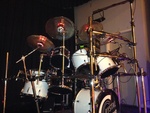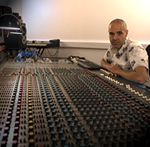- Posts: 26
- Thank you received: 2
Understanding time and phase alignment, chapter 1.
- Pasi
-
 Topic Author
Topic Author
- Offline
- Moderator
-

As promised i'll share my experience and knowledge about sound systems here to help all of you in your mission for good sound. We will start this alignment thing by checking with some pics what different situation we have and how they can be sorted. Sorry about picture quality, it is my limited softwares and knowledge to use them smiley23 . I may use some different terms or ways of doing these things, so be patient and remeber that this is just my way, someone else has different approach. I've managed to get good results with this way like i'm doing it so it gives you at least a good starting point.
Picture 1 under here shows us 4 different situations with soundwave we have everyday.
1. This is our reference wave, completely normal. Blue dot indicates the reference point to all other waves.
2. This wave is otherwise same than number 1, but it has phase shift of 180 degrees.
3. This is otherwise same as first wave, but this has reversed polarity.
4. And this last one has both reversed polarity and phase shift of 180 degrees.
Now it is time to understand difference between phase shift and polarity. Phase shift includes always time and is caused by time which equals to half of the wavelength. Polarity reverse on the other hand doesn't include time. Results may look similiar, but notice the location of blue dot. That is our time reference point. For example waves 1 and 4 are in phase but in different time caused by phase sift and polarity reverse.
In picture number 2 we have corrected all problems and all waves are in phase and in time.
To make it easier to understand what has been done, numbers are also moved and mirrored when needed.
1. This wave is now delayed by half of the wavelength involved. For example to 100Hz this would mean about 1.7 meters and about 5.5ms in time.
2. Wave two is unprocessed. It is allready in right phase and it was delayd in first picture. Since we can't take that delay off, we had to delay wave number 1 to match phase with this wave. Using polarity reverse between wave1 and this would have corrected phase issue but not time.
3. Here we had to do bit more processing and we needed to use delay which again equals to half of the wavelength and polarity reverse to match time and phase with wave number 2. (and also processed wave number 1)
4. This was quite easy to fix, just polarity reverse and we are done.
In my opinion it is important to understand difference between phase shift and polarity reverse. First one includes always time, latter one doesn't include time. Phase shift of 180 degrees looks like polarity reverse, but it isn't the same thing. It happens only when delay time equals to half of the wavelenght. More or less will give different phase angle, for example 145 dgrees.
Polarity reverse occurs for example in your Loudspeaker Management System when you select polarity reverse or when you make a mistake smiley4 (or deliberately) solder pins 2 and 3 crossed in XLR cable. These will swap the wave upside down in real time and they don't cause phase shift.
Questions and comments are wellcome. We will continue from this in next session and see, how we can recognize these phenomenas in real life with and without computer based measurement systems. We will also see what causes these issues and is there any way to avoid them?
Pasi
Please Log in or Create an account to join the conversation.
- nickyburnell
-

- Offline
- Platinum Member
-

- Posts: 802
- Thank you received: 0
Please Log in or Create an account to join the conversation.
- bee
-

- Offline
- Platinum Member
-

- Posts: 2090
- Thank you received: 34
Please Log in or Create an account to join the conversation.
- dookietwo2
-

- Offline
- New Member
-

- Posts: 16
- Thank you received: 1
I liked what you did to a point but you included time delay into your diagram and didn't include this in the total phase shift numbers.
Line 2 in relation to line 1 is 180 degrees out of phase but it is also 1 period of the wave back in time. 540 degrees out of alignment. Reverse polarity and add 1 period of the wave of delay to line 1 to fix this.
Line 3 is truely the one 180 degrees out of phase with line 1 or reverse polarity. Just reverse polarity.
Line 4 is in phase with line 1 as it sits. It is 360 degrees behind line 1. ( 1 period of the wave ) The Blue dot should be on top of the second wave like it is on line 1. This would show easier that it is 1 period of the wave behind line 1. Just delay line 1 one period of the wave to put them in alignment.
Still a great job helping people understand phase.
Doug
Please Log in or Create an account to join the conversation.
- Pasi
-
 Topic Author
Topic Author
- Offline
- Moderator
-

- Posts: 26
- Thank you received: 2
Whole point of that blue dot is mark the same peak in each wave, where it is in picture two after making all waves equal to another.
Please Log in or Create an account to join the conversation.
- dookietwo2
-

- Offline
- New Member
-

- Posts: 16
- Thank you received: 1
Pasi wrote: Doug, thanks for your comments. But i think you are wrong here. One wavelength includes both top and bottom. All lines are exactly 4 wavelenghts long. Difference between top and bottom is 180 degrees , not 360 as you claim. In first picture waves 1 and 3 start from zero and 2 &4 from 180 degree (or about 5.5ms later if that is 100Hz wave) compared to 1 and 3. Hence correcting these errors need 180 degree shift in waves 1 and 3.
Whole point of that blue dot is mark the same peak in each wave, where it is in picture two after making all waves equal to another.
Its how your worded things that makes the difference.
"2. This wave is otherwise same than number 1, but it has ((((phase shift))) of 180 degrees."
No. Line 2 is 1/2 the period of the wave behind line 1. Line 3 has 180 degrees of phase shift.
Where the Blue dots sits "Right Now" the blue dots are in the same location top to bottom scale. They are in phase but out of time alignment. Sorry my wording/math was wrong. Line 2 is LATE in time from line one. It started 1/2 cycle lated in time. But the >blue dots< are in phase.
The two waves are in phase just not in time alignment. Sorry my math was wrong.
Line 3 shows Phase difference between the dots.
Line 4 is 180 degrees out of phase from line 1 and 1/2 the period of the wave out of time alignment.
Sorry my french to english could be better. There is quite a difference between time alignment and phase when you put a dot as reference.
EDIT : To sum this up I would call the dots between lines 1 and 2 180 degrees out of time alignment with the difference between dots 1 and 3 180 degrees out of phase.
Doug
Please Log in or Create an account to join the conversation.
- COZY PILLOW
-

- Offline
- Premium Member
-

- Posts: 141
- Thank you received: 2
looking forward to the next installment.
Please Log in or Create an account to join the conversation.
- mooreman
-

- Offline
- Junior Member
-

- Posts: 21
- Thank you received: 0
So does this mean for drivers placed in reverse (magnet facing out) that i have to reverse negative and positive ends? Thanks, Sam
Please Log in or Create an account to join the conversation.
- Pasi
-
 Topic Author
Topic Author
- Offline
- Moderator
-

- Posts: 26
- Thank you received: 2
mooreman wrote: Hiya,
So does this mean for drivers placed in reverse (magnet facing out) that i have to reverse negative and positive ends? Thanks, Sam
That would give the same starting point as in situation where drivers are mounted "normally", magnets facing inside the cabinet. Then cones would be moving in the same direction with same polarity signal.
Please Log in or Create an account to join the conversation.
- Rog Mogale
-

- Offline
- Premium Member
-

- Posts: 120
- Thank you received: 19
Please Log in or Create an account to join the conversation.

